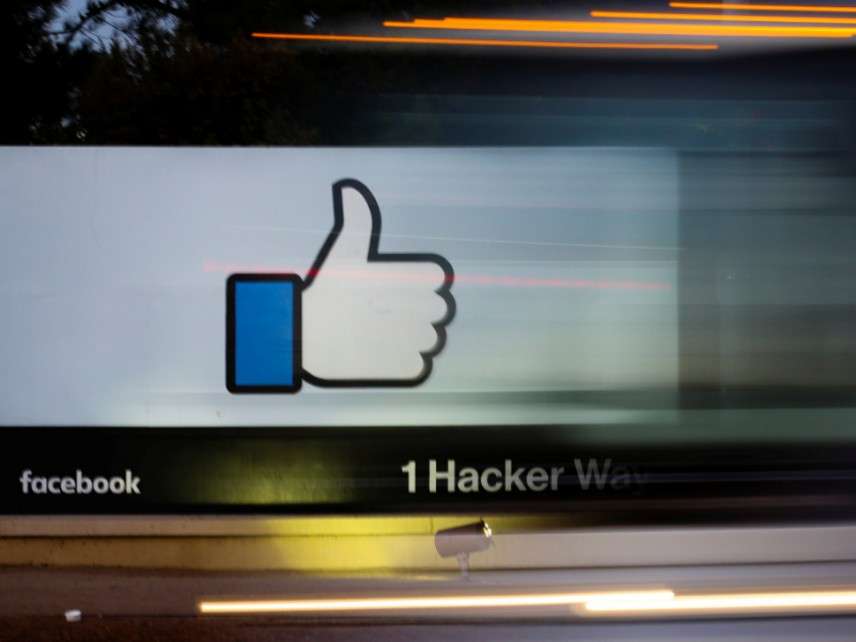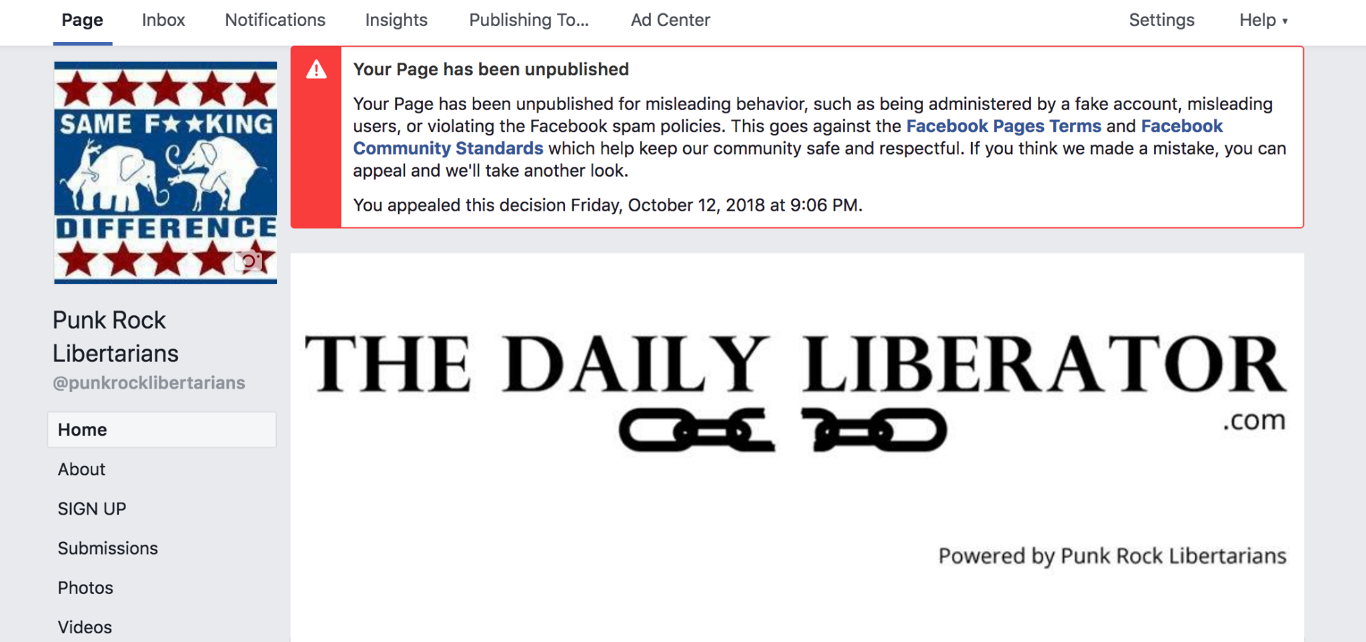Facebook Slams Independent Voices With Latest Political Purge
It's time to move beyond the social media giants to a more decentralized world that's harder to control

If Facebook is concerned about a growing chorus of accusations that the social media giant suppresses some voices and elevates others in accord with the company's prevailing political biases, that's not obvious in the firm's latest purge of political pages and accounts.
On Thursday, October 11, Nathaniel Gleicher, Facebook's Head of Cybersecurity Policy and Oscar Rodriguez, Product Manager, announced the company was shutting down 559 pages and 251 accounts "created to stir up political debate." Allegedly, the targets were guilty of "coordinated inauthentic behavior" intended "to mislead others about who they are, and what they are doing." The targeted pages and accounts included many pages, and their administrators, who have gained popularity by voicing ideas outside the mainstream—including skepticism of violent and intrusive police tactics and support for libertarian ideas.
"We lost a 190K page that we started in 2010," Matt Bergman, an administrator of Punk Rock Libertarians, told me with regard to the reach of the page Facebook shut down without warning. "I also [ran] the Daily Liberator page which had 95K people on there. Now we're starting over with a page that has less than 400 people on it."
Other purged pages included Cop Block, which is critical of law-enforcement practices, conservative Right Wing News, and progressive Reverb Press. Photography Is Not a Crime, which advocates for the right to record government officials in public places, was "severely restricted," according to former Reasoner Radley Balko.
Facebook accused the hundreds of pages it purged of distributing "spam," though the social media company used a curious definition of the word. Instead of flooding unwilling recipients with unsolicited ads, the company said, the targeted organizations posted "clickbait posts on these Pages to drive people to websites that are entirely separate from Facebook and seem legitimate, but are actually ad farms."
To the millions of supporters these pages draw, these organizations and the sites they publish almost certainly did "seem legitimate"—and still do. Perhaps Facebook doesn't like seeing readers depart its service for off-site publications that compete for eyeballs on content and ads.
In addition to the political pages themselves, page administrators' personal Facebook accounts were targeted, if only briefly.
"I was deleted for about 4 hours," Bergman messaged me. "Facebook told us all that we were deleted and asked us to upload photos of ourselves [to be restored] even tho I've been uploading photos of myself since 2008."
Like many of the other pages, Punk Rock Libertarians appealed being purged, but has yet to hear back.

Facebook has long faced charges of political bias—with evidence to support the accusations. In 2016, former employees of the social media giant told Gizmodo that co-workers regularly prevented stories of interest to conservatives and libertarians from appearing in the "trending" news section while boosting other stories. Such selective treatment was reportedly a result not of official policy, but of workers marinating in a shared mindset that affected their judgment.
Concern over that shared mindset inspired senior Facebook engineer Brian Amerige to complain in an August 2018 message to co-workers that "We are a political monoculture that's intolerant of different views." He added, "We claim to welcome all perspectives, but are quick to attack — often in mobs — anyone who presents a view that appears to be in opposition to left-leaning ideology."
Interestingly, Amerige quit shortly before the purge, informing co-workers in a memo, "I care too deeply about our role in supporting free expression and intellectual diversity to even whole-heartedly attempt the product stuff anymore, and that's how I know it's time to go."
But the timing appears to have been coincidental, and perhaps just more evidence of the controlling direction in which the company is moving.
"I don't have much context on this one," Amerige told me about the purge, "and it wasn't specifically related to my departure, no."
But if earlier concerns were about left-wing bias, the latest purge seems to represent more of a bias in favor of establishment voices. The latest purged pages don't share an ideology, but they are generally non-mainstream voices critical of government policies and institutions, and of traditional media.
Facebook isn't answering my questions about the company's motivations or decision-making. But it looks like the social media giant, under fire for enabling a few Russian government trolls and a lot of free-wheeling (if not always temperate) debate in a politically volatile time, has thrown in with the powers-that-be. The establishment may be battered, but it's not out, and muzzling anti-establishment voices could well look like a safe bet.
"We've accepted the inevitability of government regulation," Amerige lamented in his resignation letter. "Our policy strategy is pragmatism—not clear, implementable long-term principles—and our PR strategy is appeasement—not morally earned pride and self-defense."
And if Facebook manages to net a few more eyeballs for its own advertising instead of losing them to other websites, so be it.
Many of the purged pages have their own websites, and they're scrambling to find other platforms for disseminating their messages.
"Police accountability activists and other libertarians should be building alternative platforms rather than relying on those provided by political corporate behemoths like Facebook and Twitter," Ian Freeman wrote on Cop Block's website. He pointed, in particular, to the Liberdon "instance" on Mastodon, "a decentralized, open source social network."
Administrators of other purged pages are talking abut moving to MeWe, Minds, Gab, and other platforms that are either more open to diverse opinions, or at least enable distributed presences that make mass purges more difficult.
But a social media diaspora will only work if the audience follows. Now that Facebook has turned overtly hostile to independent groups "created to stir up political debate," it's time to move beyond the old social media giants and explore a broader, more decentralized world in which it will be harder to suppress voices that criticize the establishment.


Show Comments (83)